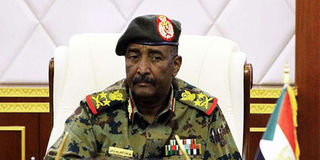Sudan's Burhan defends Israel normalisation

Sudan's army ruler General Abdel Fattah al-Burhan in Khartoum on April 16, 2019.
What you need to know:
- Sudan agreed to normalise ties with Israel in a quid-pro-quo for Washington removing Khartoum from its state sponsors of terror blacklist in the last few months of president Donald J. Trump's administration.
Khartoum,
The head of Sudan's civilian-military ruling council Monday defended his country's move to normalise ties with Israel, saying it "has nothing to do with the Palestinians' right to their own state".
The remarks, by General Abdel Fattah al-Burhan, came amid a deadly flare-up of violence between Israel and the Palestinians that has killed more than 200 people, mostly residents of the Palestinian enclave of Gaza.
Four Arab countries -- Sudan, Morocco, the United Arab Emirates and Bahrain -- last year normalised, or pledged to normalise, relations with the Jewish state.
The Palestinians have slammed the deals as a stab in the back and regional powerhouse Saudi Arabia officially maintains it will not normalise ties with the Jewish state in the absence of a peace deal granting the Palestinians their own state.
"The normalisation has nothing to do with Palestinians' right to create their own state," Burhan told France 24 on the sidelines of an investment conference in Paris.
It is merely "a reconciliation with the international community which includes Israel."
Two-State solution
Sudan agreed to normalise ties with Israel in a quid-pro-quo for Washington removing Khartoum from its state sponsors of terror blacklist in the last few months of president Donald J. Trump's administration.
During the interview, Burhan reaffirmed Sudan's own support for a two-state solution.
He also lamented Palestinian deaths in the Gaza Strip caused by Israeli airstrikes over the past week.
"What's happening in Gaza against defenseless civilians is regrettable," he said.
Israeli airstrikes have killed some 200 Palestinians in the densely populated enclave.
The violence between Israelis and Palestinians -- sparked by unrest in Jerusalem -- is the worst since 2014.
Sudan maintained a rigid anti-Israel stance during the three-decade Islamist rule of president Omar al-Bashir who was ousted amid mass protests in April 2019.
An interim civilian-military power-sharing government in power since August 2019 has been pushing to end Sudan's international isolation.
In January, Sudan signed the "Abraham Accords" paving the way to normalising ties with Israel, and in April, it approved a bill abolishing a 1958 boycott of the Jewish state.





